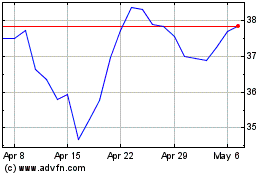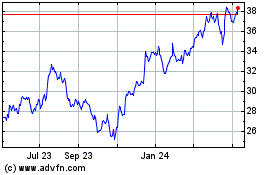BofA: Fiduciary Rule Behind Decision to End Commission-Based Retirement Accounts
October 17 2016 - 3:09PM
Dow Jones News
By Michael Wursthorn
Bank of America Corp. executives called a key provision of the
Obama administration's new rules on retirement accounts
"inefficient and cumbersome," saying it contributed to their
decision to end commission-based retirement accounts.
While discussing third-quarter earnings with analysts on Monday,
executives of the Charlotte, N.C., bank further detailed the
reasoning behind their decision earlier this month to stop giving
advice to retirement savers who pay a commission after April, when
new rules that require brokers to act in the best interests of
retirement savers begin to take effect.
Instead, clients of the bank's Merrill Lynch brokerage who want
retirement advice will have to pay a fee based on a percentage of
their assets, which could mean higher costs for clients who prefer
to buy and hold investments.
The rules, which were written by the Labor Department, are aimed
at eliminating conflicted retirement advice from brokers that the
government says costs American families $17 billion a year and
pushes down annual returns on their retirement savings by a
percentage point. Financial-industry leaders have said those
figures are inflated.
While drafting the rule, the Labor Department maintained that
commission-based individual retirement accounts are a better option
for some retirement savers. It crafted a provision, known as the
best-interest contract exemption, or BICE, to allow brokers to
receive variable or commission-based compensation in some
circumstances.
Bank of America executives said the provision was unworkable
with IRAs.
"We came to this decision not to use the best exemption after a
lot of months of thinking and research, and this is better for our
advisers and it's better for our clients," Chief Financial Officer
Paul Donofrio said. "The best-interest exemption is going to create
confusion, it's got operational pain for clients [and] it's going
to be inefficient and cumbersome for advisers."
Many brokerages haven't detailed how they plan to comply with
the new retirement-account rules, which are expected to affect as
much as $3 trillion of assets in the U.S., according to researcher
Morningstar Inc. Some firms, such as Edward Jones and LPL Financial
Holdings Inc., are using the best-interest contract exemption to
continue offering some form of a commission-based IRA to
investors.
The Labor Department didn't immediately comment on Bank of
America's points.
Analysts and industry experts have said best-interest contracts
carry considerable risks for brokerages since firms have to justify
the varying compensation they can receive for investment products
in commission-based accounts. It also opens firms up to
class-action lawsuits from investors who feel their interests
weren't served.
"That kind of potential liability is really enormous," said Kent
Mason, a partner at law firm Davis & Harman LLP who focuses on
retirement. "If you interpret something wrong under the
[best-interest contract], every trade you did can be part of this
class action."
Bank of America plans to use best-interest contracts only to
advise Merrill Lynch clients on rollovers from commission-based
accounts and 401(k) plans to a fee-based option.
Even before the new retirement rules were finalized, commissions
had been declining in favor of fees.
Now the brokerage industry is expected to shift more clients
from accounts that charge investors for each transaction made to
those that charge a fee based on a percentage of the portfolio's
assets.
Fee-based accounts tend to be more lucrative for brokerages.
Morningstar estimates that fee-based accounts generate 60% more
revenue than accounts that charge a commission. Brokerages say
those higher fees are justified since fee-based accounts demand a
higher level of care.
The rule is expected to affect less than 10% of Merrill's $2
trillion in assets, the bank has said. Merrill Lynch plans to offer
discounts to clients who move to a fee-based IRA account, but the
firm hasn't provided details on those price cuts.
Commissions have been a drag on Bank of America's wealth unit in
recent quarters, as market volatility has caused clients to trade
less, the bank said.
Third-quarter revenue at the bank's global wealth unit, which
includes Merrill and private bank U.S. Trust, declined 2% to $4.4
billion from a year earlier because of lower commission revenue. Of
that total, $500 million came from commissions, Chief Executive
Brian Moynihan said.
The rules will likely cause "some modest revenue impact" in
2017, Mr. Donofrio said, but the buildup in fee-paying assets is
expected to mitigate that in later years.
Commissions have "been declining in favor of financial advice to
the client," Mr. Moynihan added. "You've seen a constant growth in
asset-management fees, net interest income and other sources of
revenue. And frankly a constant decline in the brokerage business
across many years."
Write to Michael Wursthorn at Michael.Wursthorn@wsj.com
(END) Dow Jones Newswires
October 17, 2016 14:54 ET (18:54 GMT)
Copyright (c) 2016 Dow Jones & Company, Inc.
Bank of America (NYSE:BAC)
Historical Stock Chart
From Mar 2024 to Apr 2024

Bank of America (NYSE:BAC)
Historical Stock Chart
From Apr 2023 to Apr 2024
